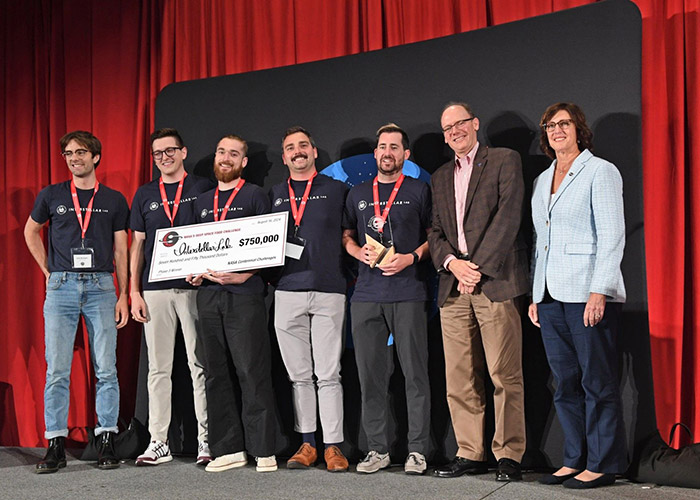

Interstellar Lab has taken home the $750,000 grand prize in NASA’s Deep Space Food Challenge. Interstellar, a small company with team members from France, Texas and Florida, has developed a food system that combines multiple autonomous phytotrons and environmentally controlled greenhouses that support a growing system that includes a self-sustaining food production mechanism that generates fresh vegetables, microgreens and insects necessary for micronutrients.
The two runners-up each received $250,000 for their efforts. The California university team Nolux, led by Robert Jinkerson, constructed an artificial photosynthesis system that can produce plant- and fungi-based foods without biological photosynthesis. The Colorado company SATED developed a variety of fireproof, shelf-stable and customizable foods.
According to NASA, the competitors’ technologies address the agency’s need for sustainable food systems for long-term stays in space, including future Artemis missions and eventual trips to Mars. Advanced food systems could also benefit life on Earth, stimulating food production in parts of the world vulnerable to natural disasters, food shortages and extreme environmental conditions.
Since the competition launched in 2021, more than 300 teams from 32 countries have entered their clever food system designs. Four U.S. teams competed in Phase 3, which began in September 2023. The Methuselah Foundation partnered with Ohio State University to support the final phase of the competition, which included a two-month testing and demonstration period on the university’s campus in Columbus, Ohio. Each U.S. team in Phase 3 received $50,000 and brought its technology to Columbus for testing.
During this phase, teams constructed full-fledged food production systems that had to meet development milestones such as safety, sensory testing, palatability and harvest quantities. Each team worked with a group of Ohio State students who led the testing and demonstrations for Phase 3 during the eight weeks. The data collected during the testing was presented to a panel of judges who determined the winner.
The competition culminated at the Deep Space Food Symposium, a two-day networking and learning summit held on August 15 and 16. Throughout the event, attendees met Phase 3 finalists, saw demonstrations of food production technologies, and participated in panel discussions with experts from NASA, government, industry, and academia. Competition winners were announced at an awards ceremony at the end of the symposium.
“Congratulations to the winners and all the finalist teams for their years of work on innovative solutions for the Deep Space Food Challenge,” said Amy Kaminski of NASA. “These food production technologies could change the future of food availability on other worlds and our home planet.”
NASA has also selected and awarded an international team as the winner of Phase 3: The Finnish company Solar Foods has developed a food production system through gas fermentation based on the protein production of individual cells.
“The Deep Space Food Challenge could serve as a framework for providing astronauts with healthy and delicious food using sustainable mechanisms,” said Angela Herblet of NASA.
The Deep Space Food Challenge, a NASA Centennial Challenge, is a coordinated effort between NASA and the Canadian Space Agency. Subject matter experts from the Johnson Space Center and Kennedy Space Center supported the competition. NASA’s Centennial Challenges are part of the NASA Space Technology Mission Directorate’s Prizes, Challenges and Crowdsourcing program and are administered by the Marshall Space Flight Center in Huntsville, Alabama. The Methuselah Foundation, in partnership with NASA, oversees the U.S. and international competitors.
